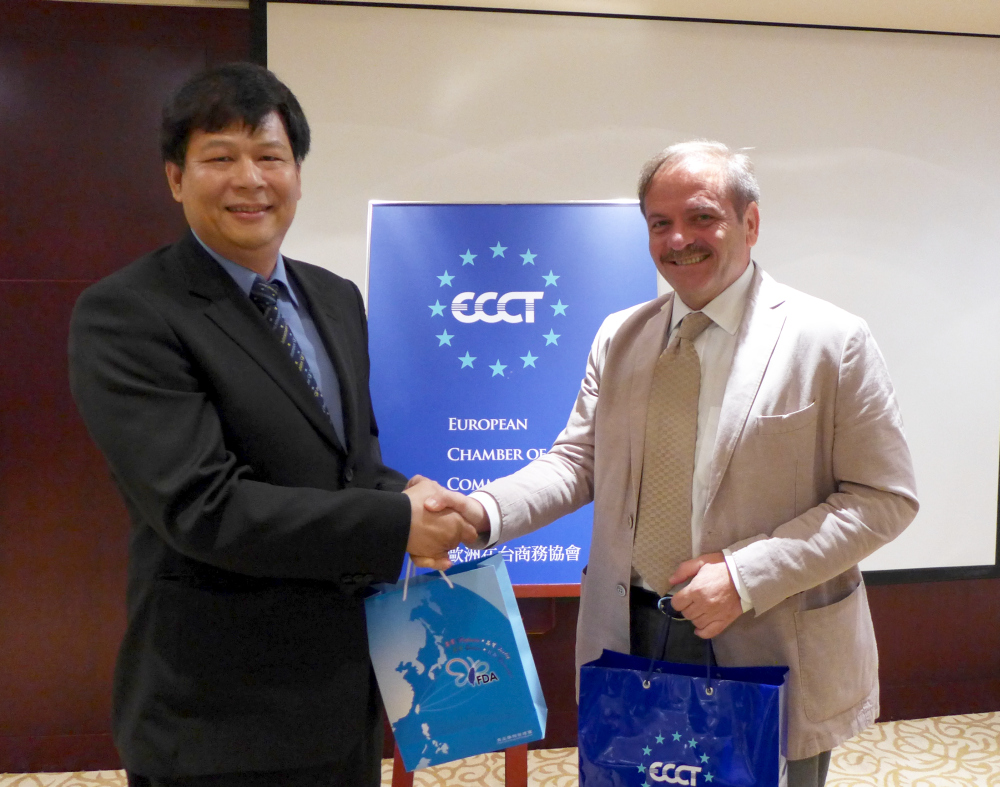Lunch with TFDA Director General Yeh Ming-kung

The event was attended by around 90 ECCT members, guests and senior officials from the TFDA. Dr Yeh gave opening remarks after which his colleague Director Liu presented a short overview of the TFDA. During his remarks, Yeh introduced several of his senior colleagues, who attended the lunch and were seated at different tables in order to answer questions and exchange views with members. After the presentations, Dr Yeh answered a number of questions from the floor and, in several instances, asked for additional follow-up details from his colleagues.
In his opening remarks, Director General Yeh said that he wished to foster a more open-minded approach and attitude within the TFDA that seeks a positive interpretation of regulations. According to the traditional approach, where regulations do not provide a specific answer as to whether or not a certain action is permissible, officials tend to say that it is not permissible. Yeh said that he wants officials to be open to the possibility of "yes" in these instances. In addition, Dr Yeh wants to foster an open attitude towards industry, in order to benefit from new innovations and thinking. Furthermore, Yeh wants a more open dialogue with NGOs. Yeh also aims to improve internal communication (among government departments) to improve efficiency as well as external communication with industry and regulators in other countries with a view towards improving transparency and bringing Taiwan's systems in line with the best international standards and practices.
Director Liu gave a short overview of the TFDA. The formation of the Taiwan Food and Drug Administration (TFDA) was completed on 1 January 2010. When it was formed, the Bureau of Food Safety, Pharmaceutical Affairs, Food and Drug Analysis and Controlled Drugs were consolidated under the TFDA. In 2013, along with other government restructuring, the former Department of Health was restructured as the Ministry of Health and Welfare (MoHW).
The TFDA's mission is to assure the quality and safety of food and pharmaceutical products and to facilitate cooperation with its international counterparts. The TFDA has seven divisions, three regional administration centers and other supporting departments. The TFDA's future plans include establishing an integrated, accountable and science-based regulatory system, ensuring the safety and quality of TFDA-regulated products and building up official communication and collaboration channels with relevant international agencies.
The TFDA oversees the entire food and drug supply chain from materials to market. It is also devoted to improving the management systems of food and drugs. Food safety management covers the entire chain from the source to restaurant sanitation. The TFDA performs surveillance and inspections of domestic and imported food products on a regular basis to ensure they are consistent with corresponding standards. Through cooperation with local health departments, the TFDA also monitors food production and dinning environments for food hygiene.
Regulation of medicinal products also covers the whole life cycle, starting from new drug discoveries, through pre-clinical testing to product launches and marketing. Drug surveillance is crucial to post-market safety and quality. It includes both passive and active surveillance.
The management of cosmetics is divided into four stages: Source, pre-marketing, post-marketing and consumer education. Manufacturing management covers medicated cosmetics, cosmetic pigments and advertising reviews, random testing and listing post-market products, monitoring domestic and international alerts, strengthening consumer safety education and communication.
Liu concluded by saying that greater cooperation between the TFDA, industry and consumers will help to create an even safer and more consumer-friendly environment in the future.
